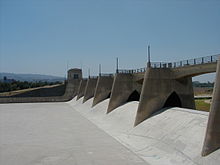| Sepulveda Dam | |
|---|---|
 | |
| Country | United States |
| Location | San Fernando Valley, California |
| Coordinates | 34°10′02″N 118°28′24″W / 34.1671°N 118.4732°W |
| Purpose | Flood control |
| Status | Operational |
| Construction began | 1940 |
| Opening date | 1941 |
| Construction cost | $6,650,561[1] |
| Owner(s) | |
| Dam and spillways | |
| Impounds | Los Angeles River |
| Height (thalweg) | 57 feet (17 m) |
| Length | 2.93 miles (4.72 km) |
| Elevation at crest | 725 feet (221 m) |
| Width (crest) | 30 feet (9.1 m) |
| Spillway type | Concrete ogee |
| Reservoir | |
| Total capacity | 17,300 acre⋅ft (21,300,000 m3) |
| Website Corps Lakes Gateway - Sepulveda Dam | |
The Sepulveda Dam is a dry dam constructed by the U.S. Army Corps of Engineers to withhold winter flood waters along the Los Angeles River. Completed in 1941, at a cost of $6,650,561 (equivalent to $137,766,000 in 2023), it is located south of center in the San Fernando Valley, approximately eight miles (13 km) east of the river's source in the western end of the Valley, in Los Angeles, California.[1]
Sepulveda Dam, along with Hansen Dam located in the north San Fernando Valley, was constructed in response to the historic 1938 floods which killed 144 people. The dam's 17,300-acre-foot (21,300,000 m3) capacity would allow it to hold back roughly 2+1⁄4 inches (57 mm) of runoff from the 141 square miles (370 km2) of catchment upstream. It was placed at what was the then-current edge of the city. East of the dam, the river was crowded into a narrow channel by the city's growth. The flood control basin is a large and undeveloped area in the center of the Valley, used mostly for wildlife refuge and recreation. After the 1938 Los Angeles River flood, the channelization of all the Valley's dry washes created with dry, concrete-lined river bottoms. Currently these are being devolved in part as interconnecting bike paths.[2]
Behind the dam, the Sepulveda Basin is home to several large recreation areas including Woodley Park, a model aircraft field, The Japanese Garden, a wildlife refuge,[3] a water reclamation plant, and an armory. The facilities are compatible with occasional inundation from reservoir impoundment.[4]
It is a location for films (such as Escape from New York), music videos (such as BTS's "On (Kinetic Manifesto)" They Might Be Giants' "The Statue Got Me High" and Keedy's "Save Some Love"), and car commercials.[citation needed]
- ^ a b "Sepulveda Dam Basin Master Plan and Environmental Assessment" (PDF). U.S. Army Corps of Engineers. Archived from the original (PDF) on March 8, 2014. Retrieved March 7, 2014.
- ^ "The LA River and the Corps: A brief history". U.S. Army Corps of Engineers. Archived from the original on March 8, 2014. Retrieved March 8, 2014.
- ^ "Sepulveda Basin Wildlife Reserve". City of Los Angeles Department of Recreation and Parks. Retrieved April 8, 2014.
- ^ "Rainstorm creates reservoir impoundment behind Sepulveda Dam" (Press release). US Army Corps of Engineers, Los Angeles District. February 4, 2024. Retrieved June 18, 2024.
